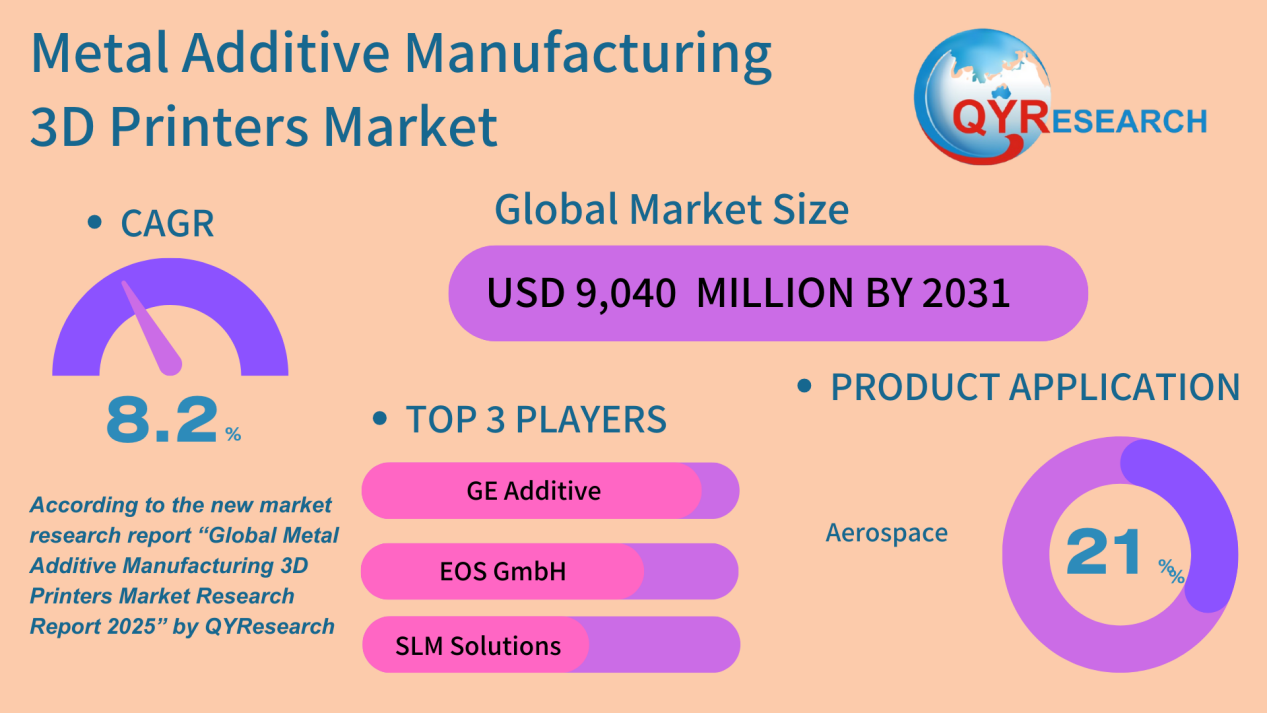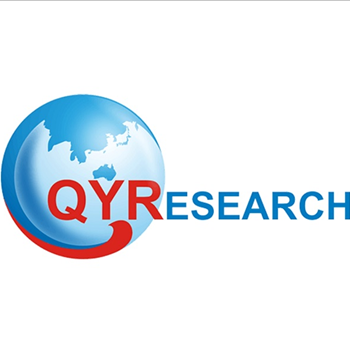Right Now
Global Metal Additive Manufacturing 3D Printers Market to Expand at 8.2% CAGR Through 2031
According to the recent report by QYResearch, the global Metal Additive Manufacturing 3D Printers market is poised for robust growth, projected to rise from USD 5.2 billion in 2024 to USD 9.04 billion by 2031, representing a compound annual growth rate (CAGR) of 8.2% over the forecast period 2025–2031.

Metal Additive Manufacturing 3D Printers enable the production of complex metal parts through layer-by-layer construction using metal-based materials. These machines are revolutionizing industries that demand high precision and structural complexity, such as aerospace, medical devices, automotive manufacturing, and industrial tooling.
Market Leaders and Company Developments
Leading manufacturers include GE Additive, EOS GmbH, SLM Solutions, Renishaw, Trumpf, DMG Mori, 3D Systems, AddUp, Desktop Metal, Velo3D, Arcam AB, BeAM Machines, Xact Metal, Prima Additive, and Meltio. Among them, Meltio made headlines in 2024 by launching the M600 wire-laser printer, capable of handling copper, aluminum, stainless steel, and other alloys, winning the "Enterprise 3D Printer of the Year (Metals)" award.
In a strategic expansion move, BLT Europe partnered with Cheylus 3D in early 2025 to strengthen its presence in the Benelux region, targeting applications in semiconductors, energy, and precision engineering. Meanwhile, HP and India-based INDO-MIM expanded their collaboration with the integration of HP’s Metal Jet S100 printers for localized production of metal components.
Metal Additive Manufacturing 3D Printers - Product Model List
GE Additive
Concept Laser M2 Series 5 – DMLM system for high-quality parts
Arcam EBM Q10plus – Focused on orthopedic implants
Arcam EBM Q20plus – Aerospace-grade Electron Beam Melting system
EOS GmbH
EOS M 290 – Flagship DMLS printer with proven industrial reliability
EOS M 300-4 – High productivity with four-laser system
EOS M 400-4 – Large build volume with quad-laser
SLM Solutions
SLM 280 2.0 – Versatile multi-laser system for prototyping and production
SLM 500 – Quad-laser system with industrial performance
NXG XII 600 – High-performance printer with 12 lasers for large-scale parts
Renishaw
RenAM 500Q – Quad-laser LPBF system with closed-loop powder handling
RenAM 500S – Single-laser version for smaller production environments
Trumpf
TruPrint 1000 – Compact LMF printer ideal for dental applications
TruPrint 3000 – Medium-format industrial metal printer
TruPrint 5000 – High-productivity with preheating up to 500°C
DMG Mori
LASERTEC 12 SLM – Compact, high-precision LPBF system
LASERTEC 65 DED – Hybrid system combining milling and Directed Energy Deposition
3D Systems
DMP Flex 350 – High throughput and flexible metal production
DMP Factory 500 – Integrated additive manufacturing solution
AddUp
FormUp 350 – Modular industrial powder bed fusion machine
Desktop Metal
Studio System 2 – Office-friendly metal 3D printing solution
Shop System – Binder Jetting for medium batch production
Production System P-50 – Mass production with SPJ technology
Velo3D
Sapphire – Laser powder bed fusion printer for complex geometries
Sapphire XC – Extended capacity version for large parts
Technology Segmentation
The global market is segmented by technology type:
Laser Powder Bed Fusion
Electron Beam Melting
Directed Energy Deposition
Binder Jetting
Others
Laser Powder Bed Fusion remains the dominant technology due to its high resolution and ability to produce intricate parts. However, emerging technologies such as Electron Beam Melting are gaining traction, especially in high-performance sectors like aerospace and medical implants.
Application Landscape
Key application sectors include:
Aerospace
Medical Devices
Automotive Manufacturing
Industrial Tooling
Others
In particular, the aerospace sector continues to lead in adoption due to the need for lightweight, durable components. The medical device industry is rapidly growing, especially in emerging markets like India and Southeast Asia, driven by the demand for customized implants and surgical instruments.
Regional Dynamics
North America and Europe remain the primary markets, although Asia-Pacific – especially China, Japan, and South Korea – is witnessing accelerating growth. China's market is being driven by government-backed industrial innovation policies and a surge in domestic production capabilities.
Key Trends in 2025
1. Digital Integration and AI-Driven Automation
Predictive Maintenance Growth: The AI-driven predictive maintenance market is projected to grow from $0.88 billion in 2024 to $1.02 billion in 2025, with a CAGR of 15.7%.
Integration of AI in Manufacturing: AI technologies such as machine learning and analytics are being used to predict failures and optimize operations across additive manufacturing platforms.
Digital Twin Adoption: Virtual modeling of machines and systems via digital twins is enabling real-time performance tracking and process optimization in metal 3D printing.
2. Large-Format Metal 3D Printing
Market Expansion: The metal 3D printing market is forecast to grow from $12.04 billion in 2025 to $87.33 billion by 2034 at a CAGR of 24.63%.
Structural Efficiency: Large-format AM systems reduce part count and material waste by printing massive components in one piece, making them ideal for aerospace and defense.
High-Performance Applications: Critical sectors including automotive and energy are integrating large-format machines to create complex, heat-resistant structures like turbine blades.
3. Geopolitical Influence and Supply Chain Diversification
Tariff Impacts: U.S. trade policies and tariffs have prompted manufacturers to reconsider sourcing strategies and pursue regionalized production models.
Nearshoring Strategy: Companies are moving supply chains closer to end markets to reduce geopolitical risks and enhance logistical flexibility.
Use of Bonded Warehouses: Importers are increasingly turning U.S. warehouses into bonded zones to delay duties and manage costs amid fluctuating tariffs.
4. Sustainability in Manufacturing
Recyclable Materials: Companies are prioritizing the use of metal powders that can be recycled efficiently, aligning with circular economy goals.
Energy Efficiency: Improvements in process design and equipment are helping reduce electricity consumption and carbon emissions during production.
Corporate Responsibility: Major AM players, including HP, are pledging eco-conscious practices, integrating recycled materials, and reducing overall print waste.
Conclusion
The Metal Additive Manufacturing 3D Printers market is entering a pivotal phase of innovation and commercialization. Driven by strong demand across high-growth sectors and ongoing technological advancements, the market is well-positioned to achieve significant milestones by 2031. Stakeholders should monitor emerging technologies and regional developments closely to optimize strategic positioning and capitalize on evolving opportunities.
Related Reports:
Global Metal Additive Manufacturing 3D Printers Sales Market Report, Competitive Analysis and Regional Opportunities 2025-2031
https://www.qyresearch.com/reports/4713865/metal-additive-manufacturing-3d-printers
Global Metal Additive Manufacturing 3D Printers Market Research Report 2025
https://www.qyresearch.com/reports/4713863/metal-additive-manufacturing-3d-printers
Metal Additive Manufacturing 3D Printers - Global Market Share and Ranking, Overall Sales and Demand Forecast 2025-2031
https://www.qyresearch.com/reports/4713862/metal-additive-manufacturing-3d-printers
Global Metal Additive Manufacturing 3D Printers Market Insights, Forecast to 2031
https://www.qyresearch.com/reports/4713851/metal-additive-manufacturing-3d-printers
About Us
QYResearch founded in California, USA in 2007. It is a leading global market research and consulting company. With over 18 years’ experience and professional research team in various cities over the world QY Research focuses on management consulting, database and seminar services, IPO consulting, industry chain research and customized research to help our clients in providing non-linear revenue model and make them successful. We are globally recognized for our expansive portfolio of services, good corporate citizenship, and our strong commitment to sustainability. Up to now, we have cooperated with more than 66,000 clients across five continents. Let’s work closely with you and build a bold and better future.
Contact Us:
If you have any queries regarding this report or if you would like further information, please contact us:
QY Research Inc.
Add: 17890 Castleton Street Suite 369 City of Industry CA 91748 United States
E-mail: global@qyresearch.com
Tel: 001-626-842-1666(US) 0086-133 1872 9947(CN)
EN: https://www.qyresearch.com
JP: https://www.qyresearch.co.jp
More Posts



















Report This Post
Please complete the following requested information to flag this post and report abuse, or offensive content. Your report will be reviewed within 24 hours. We will take appropriate action as described in Findit terms of use.


